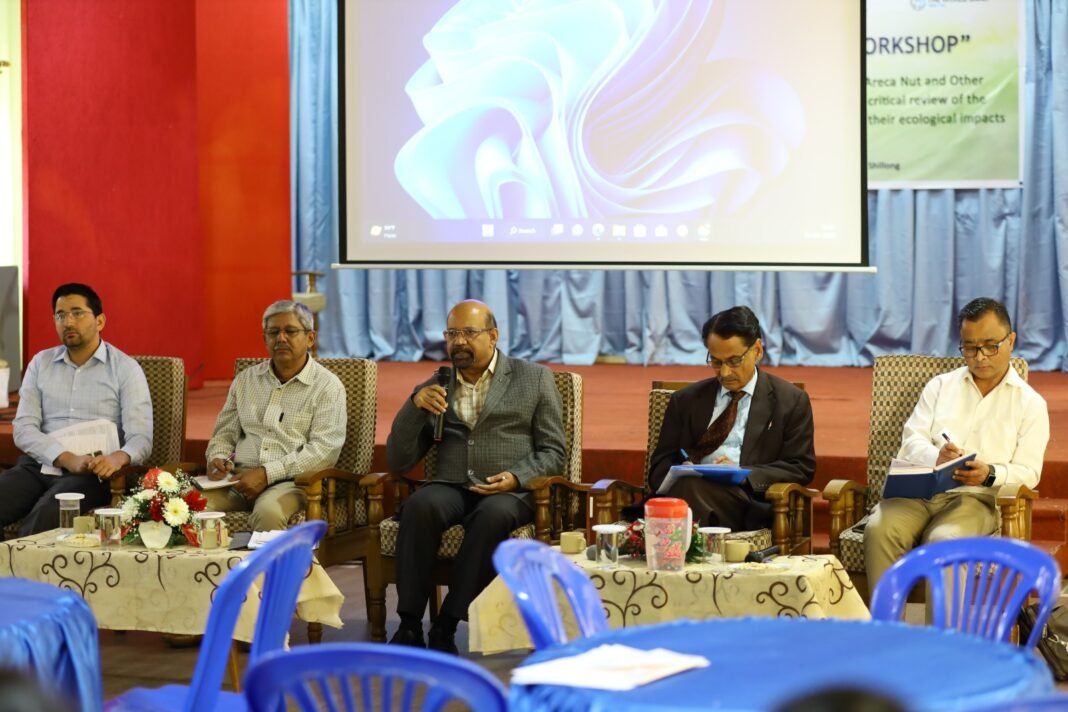The Centre of Excellence (CoE) for NRM and Sustainable Livelilhood, Meghalaya, organized a workshop on “Expanding Areas of Plantations of Areca Nut and Other Commercial Species in Meghalaya: Critical review of the changing landscapes with reference to their ecological impacts” on 13th April 2023. The workshop aimed to explore the significant changes in land use and land cover in the state and its impact on natural resources and livelihood activities.
The keynote speaker of the workshop, Dr. S Ashutosh, IFS (retd.),Director and Co- Chairman Centre of Excellence, provided an overview of the workshop's objectives and emphasized the importance of scientific understanding to manage resources and inform people about the consequences. Dr. Ashutosh highlighted the concern about the rapid changes in land use and land cover in Meghalaya, especially in Garo Hills, where the expansion of cash crop plantations is impacting the livelihood activities of farmers. He also emphasized that climate change is a matter of everybody's perception,
and its biggest impact is on natural resources, especially the farmers.
Dr. Ashutosh presented his ongoing study on land use and land cover change in Meghalaya, covering the entire state. The study analysed seven grids of 100 sq. km area and will be completed using 20 to 22 grids covering 2022 sq km, which is 10% of the total geographic area. The study has showed that over the period of 11 years plantation has increased by 300% in Garo Hills region in which areca nut takes maximum plantation cover. He also mentioned that under the Community Led Landscape Management Project supported by World Bank estimated 49.61 lakh areca trees in the community forests in 161 CLLMP villages in Garo Hills only.
Dr. Ashutosh concluded his presentation saying that land use and land cover change is essential information for the planning process and resource management. The changes in land use and land cover in Meghalaya have a significant impact on the natural resources and livelihood activities of the people. Therefore, it is crucial to undertake steps scientifically to address the changes and ensure sustainable development.
Mr. David Gandhi, Consultant for SALT farming at MBMA, presented on the “Land use in Meghalaya in the context of agro-horticulture and NRM – with sharing from his field experiences in Meghalaya and Manipur.Mr. Gandhi also explained how the soil should be built for the conservation of nutrients and the improvement of soil health. He showed a series of videos from his field visits to different districts for his study. He emphasized the need to look beyond increasing production to conservation, as a lot of research has been done, but the challenge is how to bring it to the farmers. The major crops grown in Meghalaya are Ginger, turmeric, and potato, with Khasi, Jaintia, and Rib Hoi being the main regions for cultivation.
Shri. M. Kharbani, during his presentation on “Critical review of the cnanging landscape, with reference to their ecological impacts 0Areca nut and other commercial species in Meghalaya”, presented the maintenance of the crop in a picture of an areca nut plantation. Monocropping is always detrimental and not encouraged. Problems with the root system in areca nut have led to nutrients being washed away by the rain, but measures like proper spacing and cultural operations can help. To promote diversity, crops with minimal shade like coffee, banana, coconut, mulberry, pepper, La met, etc., can be grown alongside arecanut. He also recommended visiting and improving on what farmers are practicing, as well as using leeches as feed for chicken to increase profits.
Mr. Kharbani also mentioned that arecanut replaced oranges in War Jaintia due to the lack of mulching and proper care given to the crops. It was suggested to pay back a portion of the profit from the field to improve the soil.
The presentation emphasized that sustainable agriculture practices are necessary to address the ecological imbalance in Meghalaya. The onus is on us to work towards a better future for agriculture and the environment.
Other presenters at the workshops includes Prof. B. K. Tiwari, former professor NEHU, Dept. of Environmental Studies on the topic “Extent, causes and impacts of expansion of cash crops (areca nut) plantation and possible solutions to their ecological impacts.”, Dr. N. Raju Singh, Scientist, Agroforestry, DSRE, ICAR on topic “Agroforestry: a diversifies land use system for livelihood improvement and climate change anf mitigation”, Dr. H. Siangbood, Project Scientist, MINR, MBDA on topic “Integration of Aromatic plants in different cropping system”, Shri. James T Kharkongor, DPD, Centre of Excellence for NRM & SL, MBDA on topic “A brief comparison on the impacts of commercial plantation in Garo Hills and Khasi Hills” , Dr. Lavinia Mary Dkhar, Technical Specialist- NRM, CoE for NRM & SL on topic “Adverse impacts of monoculture plantation ecosystems” and Shri Sanwar M Swamy (IFS), DFO, Silviculture.




